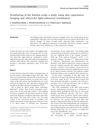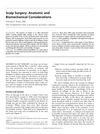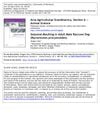 58 citations,
March 2020 in “Scientific Reports”
58 citations,
March 2020 in “Scientific Reports” EGFR-TKIs can cause significant skin, nail, and organ side effects.
 24 citations,
January 2008 in “KARGER eBooks”
24 citations,
January 2008 in “KARGER eBooks” The document concludes that ongoing research using animal models is crucial for better understanding and treating Alopecia Areata.
 19 citations,
July 2009 in “Clinical and Experimental Dermatology”
19 citations,
July 2009 in “Clinical and Experimental Dermatology” The study found that long-term sun exposure does not significantly affect follicular plugs on the scalp, and the scalp's appearance is unique compared to other body parts.
 17 citations,
January 2019 in “Journal of cancer”
17 citations,
January 2019 in “Journal of cancer” The formula YH0618 can reduce the harmful side effects of the chemotherapy drug Doxorubicin and protect healthy cells.
 15 citations,
July 2020 in “Stem Cell Research & Therapy”
15 citations,
July 2020 in “Stem Cell Research & Therapy” Stem cell therapy helps heal burn wounds, especially second-degree burns, by promoting blood vessel growth and reducing inflammation.
 14 citations,
May 2012 in “Endocrine Research”
14 citations,
May 2012 in “Endocrine Research” The same hormone can affect gene expression differently in various tissues, which could lead to new treatments for conditions like hair loss.
 14 citations,
September 2001 in “Dermatologic Surgery”
14 citations,
September 2001 in “Dermatologic Surgery” The document concludes that following specific surgical guidelines can improve scalp surgery results and reduce complications.
 13 citations,
January 2018 in “Cellular Physiology and Biochemistry”
13 citations,
January 2018 in “Cellular Physiology and Biochemistry” Fat-derived stem cells can help protect and repair skin stem cells from aging caused by UV light.
7 citations,
March 2020 in “Journal of King Saud University. Science/Maǧallaẗ ǧāmiʹaẗ al-malik Saʹūd. al-ʹUlūm” AiQingHua oil improves blood flow and promotes hair growth in mice.
 6 citations,
November 2018 in “Histochemistry and Cell Biology”
6 citations,
November 2018 in “Histochemistry and Cell Biology” Mongolian gerbils heal wounds differently than mice, with unique protein levels and gene expression that affect skin repair.
 3 citations,
May 2023 in “Precision clinical medicine”
3 citations,
May 2023 in “Precision clinical medicine” Researchers found four genes that could help diagnose severe alopecia areata early.
 3 citations,
August 2011 in “InTech eBooks”
3 citations,
August 2011 in “InTech eBooks” The document concludes that skin grafts are essential for repairing tissue loss, with various types available and ongoing research into substitutes to improve outcomes and reduce donor site issues.
 2 citations,
January 2023 in “BioMed Research International”
2 citations,
January 2023 in “BioMed Research International” Beetroot extract nanogel may help treat hair loss caused by testosterone.
 2 citations,
August 1995 in “Acta agriculturæ Scandinavica. Section A, Animal science”
2 citations,
August 1995 in “Acta agriculturæ Scandinavica. Section A, Animal science” Adult male raccoon dogs shed their winter fur in spring and grow new fur for winter in autumn.
 1 citations,
January 2015 in “Journal of nutrition & health”
1 citations,
January 2015 in “Journal of nutrition & health” Fish oil improves skin health in people with diabetes and high cholesterol.
 1 citations,
March 2023 in “PloS one”
1 citations,
March 2023 in “PloS one” Different amounts of daylight affect cashmere growth in goats by changing the activity of certain genes and molecules.
 1 citations,
September 2022 in “JMIR dermatology”
1 citations,
September 2022 in “JMIR dermatology” Alopecia Areata greatly affects the quality of life and mental health of Canadian patients and their caregivers.
 1 citations,
January 2020 in “Recent Research in Genetics and Genomics/Recent Research in Genetics and Genomics ”
1 citations,
January 2020 in “Recent Research in Genetics and Genomics/Recent Research in Genetics and Genomics ” High doses of Lepidium sativum seed extract are toxic and should be used with caution.
 1 citations,
July 2017 in “Clinical research in dermatology”
1 citations,
July 2017 in “Clinical research in dermatology” Hair loss, known as Androgenetic Alopecia, is often caused by hormones and can be diagnosed using noninvasive techniques. Treatments include topical minoxidil and oral finasteride, with new treatments being explored. There may also be a link between this type of hair loss and heart disease risk.
 May 2024 in “Portuguese journal of dermatology and venereology”
May 2024 in “Portuguese journal of dermatology and venereology” Reassurance and counseling are key in managing acute telogen effluvium, with supplements possibly offering a placebo effect.

Gender-specific analysis could improve treatment for childhood systemic lupus erythematosus.
 October 2023 in “The Cochrane library”
October 2023 in “The Cochrane library” The medicine baricitinib was found to notably improve hair regrowth in alopecia areata, but more research is needed on its side effects and other treatments.
 June 2022 in “Veterinary evidence”
June 2022 in “Veterinary evidence” Clomipramine alone does not reduce overgrooming in cats with psychogenic alopecia.

OCT can effectively screen and diagnose various medical conditions non-invasively.
 September 2013 in “Molecular Biology”
September 2013 in “Molecular Biology” The document suggests that activating autophagy might help with regeneration by removing old and damaged cells.
October 2022 in “Frontiers in Bioengineering and Biotechnology” Bioengineered nanoparticles can effectively treat hair loss by targeting specific enzymes and receptors.
 September 2001 in “Dermatologic Surgery”
September 2001 in “Dermatologic Surgery” Scalp surgery guidelines ensure best cosmetic results and fewer complications.
 41 citations,
April 2016 in “Journal of experimental botany”
41 citations,
April 2016 in “Journal of experimental botany” RACB in barley is crucial for cell polarity and nucleus positioning, aiding fungal infection.
 4 citations,
January 2009 in “Indian Journal of Dermatology, Venereology and Leprology”
4 citations,
January 2009 in “Indian Journal of Dermatology, Venereology and Leprology” A patient with granuloma annulare experienced both isotopic and isomorphic responses, with skin lesions responding to steroids but relapsing after stopping treatment.
February 2025 in “Folia Medica” Low vitamin D levels may be linked to early hair loss in males.



























